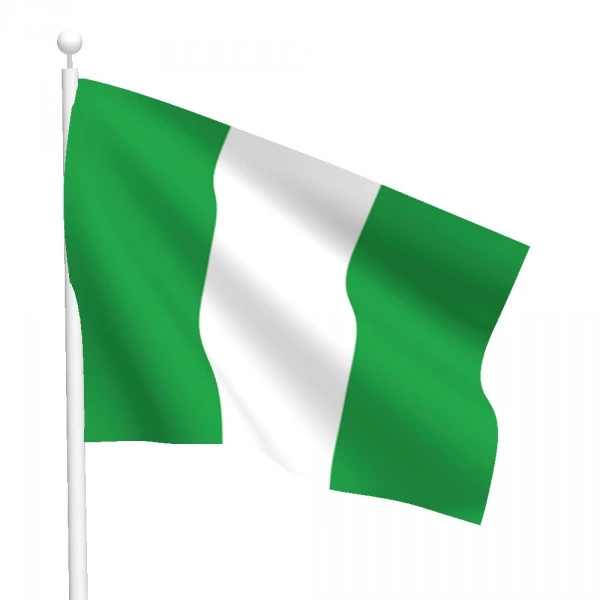
By Sunday ADEPOJU
Civilian and military regimes combined, the North has ruled more than the South in Nigeria. Narrowing the analysis to the return of democracy in 1999 after military interregnum and to 2023, it is clear that the North would have held the presidency for 11 years while the South spent eight years. Out of the years spent by the South, the South-West, represented by Chief Obasanjo, tasted it for eight years while the South-South, led by Dr Goodluck Jonathan, held sway for three years as vice president, one year as acting president and four years as president. Worrisome, from the South, South-East, comprising the Igbo, is the only zone that has not tasted power, either president or vice president since 1999. In the North too, only North-West zone has all the years spent, precisely Katsina State. From Adamawa State in the North-East, Alhaji Atiku Abubakar was vice president for eight years.
Obviously, zones are still agitating for the exalted seat. Even, the South-West claims it is still its turn to produce the president. One of the reasons given is that the zone deserves the slot as a reward for its loyalty to President Buhari and the North. In what may sound absurd, a group in the South said Obasanjo was not the choice of the Yoruba when he ruled as president, pointing out that he was imposed by a former governor of the Central Bank of Nigeria (CBN), late Malam Adamu Ciroma and the northern cabal then. There have also been allegations that Obasanjo did not represent the interest of the Yoruba while in power between 1999 and 2007. It was claimed that his loyalty was to the northern bloc that brought him to power.
Though the idea of shifting the presidency to the South may not seem to go well with the northern elite, it has been a recurring issue as some eminent leaders, now and in the past, canvassed for a southern president come 2023. However, some believe that rotational system should be discarded. Some of them premised their views on the need to ensure that credible leaders emerge as presidents of the nation. They opine that where the presidents comes from is never important; they view that it is more important to install credible and qualified individuals who could deliver and nip Nigeria’s challenges in the bud.
Recently, there have been reactions to a suggestion by the chairman of the Northern Elders Forum (NEF), Prof. Ango Abdullahi, calling on political parties to dump the idea of zoning the presidency. Reacting, the Southern and Middle Belt Leaders Forum (SMBLF) issued a warning that doing so is capable of killing and burying the country. The group cautioned political parties and political stakeholders not to tinker with zoning of presidency in the polity. The idea of the NEF received knocks from southern leaders in a statement jointly signed by Chief Edwin Clark, PANDEF national leader and SMBL chairman; Chief Ayo Adebanjo, Afenifere leader; Prof. George Obiozor, President-General, Ohanaeze Ndigbo Worldwide; and Pogu Bitrus, National President, MiddleBelt Forum.
Why South-East should get 2023 presidency
In an emotional manner, a former governor of Anambra State and chief whip of the Senate in the 9th Assembly, Senator Orji Uzor Kalu, recently lent his voice to the presidency of South-East extraction in a message titled “2023 presidency: The fairness I know.” Like others in the zone, Kalu expressly presents a presidency of the South-East zone come 2023.
Kalu stated, “The situation in Nigeria is that without the support of other regions, it would amount to a shadow chase for a South Easterner to be President. This is the reason I have been in the frontline of the call that the two major political parties, the All Progressives Congress (APC) and the Peoples Democratic Party (PDP) should zone their presidential tickets to the South-East as they did for the South-West in 1999. In the absence of this zoning, I shall return to the Senate and stay away from the presidential contest. The reality is that the North is more advantageous to win elections in this democratic setting.
“I am even shocked with the number of aspirants coming from the South-West and the South-South. It is embarrassing that these aspirants (APC and PDP) have no single respect and concern for the South-East. It has become a joke to an ordinary Nigerian who hears Southern commentators and aspirants rooting for a southern president on the premise of fairness, equity and justice.
“How can you talk about these morals when you are not even fair to your own brothers? What moral justification does a southerner who refused to be fair to his brothers have against a northerner running for president? It will be very insensitive, unreasonable and disrespectful for any southern man to criticize a presidential aspirant from the North on the ground that the North has done eight years and power should return to the South.”
Canvassing Igbo presidency, Mr Paul Madaki argued that a nation with Nigeria’s political features needs to provide rotational presidency in its Constitution. He said: “It should be the turn of the South to produce the President after Buhari finishes his tenure because that will be the natural and right thing to do. I remember how we all ganged up against Dr Goodluck Jonathan because we felt that the North was being shortchanged in terms of the number of years the South has ruled the country compared to what the North had at the time.
“Forget about those who talk about getting a bad leader when you rotate the presidency. Who told them that we don’t have good leaders scattered across the country? From Bauchi to Lagos to Imo, there are good leaders all over.”
Pointing out defects in the Constitution, Madaki stated, “In fact, what needs to change more than anything else is our Constitution. Unless we make the Constitution a people-centred one, we will continue to go round in circles and blame each other for our misfortune. So, it is fair game to allow the South produce the next president of Nigeria.”
In 2020, a leading figure in the National Democratic Coalition (NADECO) and former governor of Anambra State, Dr Chukwuemeka Ezeife, emotionally posited that any attempt not to vote for a president of Igbo extraction will be a way of rejecting the citizenship of all Igbo people. Ezeife stated, “We know that justice, fairness, and equity will require that we (Igbo /South-East) get the 2023 presidency. Yet, we must do all that is necessary and if, at the end, the Nigerian people don’t vote for our man, we will take it that Nigeria has rejected our citizenship of Nigeria.” And doesn’t all of this seem dragged under the carpet?
Elder statesman and Second Republicgovernor of Kaduna State, Late (Malam) Balarabe Musa also voiced his opinions on the 2023 presidency. Asserting that the South-East is the only zone that is yet to produce president, Musa said, “My opinion is that the 2023 presidency should go to the South-East for the purpose of equity, fairness, justice and national unity. Nigerians should look out for someone who is credible in the mould of the late Dr Nnamdi Azikwe, whom he referred to as the Great Zik of Africa, to run for the presidency in 2023.” Many others aired their opinions on Igbo presidency at the heat of discourse towards 2023, especially on the notion that zoning, though being a gentleman’s agreement and as unconstitutional arrangement, is a means of promoting equity especially in a plural society like Nigeria.
However, a bombshell from the Oluwo of Iwo, Oba Abdulrasheed Akanbi, negated the idea of electing a president of Igbo extraction, expressing lack of confidence in south-easterners. Oba Akanbi clarified, “The failure of the south-easterners to change their approach will amount to chasing shadow on their political journey of producing Nigeria’s president. The Civil War wounds meted on them is a weak factor to institutionalise policies capable of tearing the nation apart. You can’t be a leader on a sectional interest. With such unsophisticated, primitive, and uncivilized thinking, no Nigeria from other zones will vote a south-easterner as their president.”
The monarch, like other Nigerians, perhaps holds a perspective that the Igbo have always been hell-bent on avenging the treatment meted on them between 1967 and 1970. The issue of secession is still not yet dead among the Igbo.
Now, observers of trends in the two major political parties – the All Progressives Congress (APC) and the Peoples Democratic Party (PDP) – are quick to conclude that the road to the 2023 presidency is dicey and unpredictable, especially going by the actions and inactions of the leaders and power brokers in the two divides. The body language of President Muhammadu Buhari does not seem overt as to the successor of his presidency, even amidst yearnings for rotational presidency among the regions and geopolitical zones.
If the existing North/South zoning arrangement be employed in determining who should become the next president, some are of the opinion that the South-East should have it. The argument is that it remains the only geopolitical zone that has not produced president. This formed the basis of the agitation by the people of the zone to produce the next president in the spirit of equity and fairness, as the Igbo remains the only major ethnic group, out of three, that has not produced president for the country.
Bearing in mind the journey to Aso Rock in 2023 and the attending struggle for power, the overriding comments from prominent Nigerians revealed that, by 2023, the south-eastern zone should be allowed to produce the president. Asserting that the South-East is the only zone that is yet to produce president, Balarabe Musa said: “My personal opinion is that the presidency should go to the South-East for the purpose of equity, fairness, justice and national unity because it is the only zone that has never tasted the presidency in respect of the history of our nation. The North has had it, the South-West had it once and the South-South had it once. South-East is the only zone that has not had it. If we want fairness, unity and equality, we should all agree and allow the zone in 2023.”
The elder statesman further submitted that Nigerians should look out for someone who is credible in the mould of the late Chief Nnamdi Azikiwe, whom he referred as the Great Zik of Africa, to run for the presidency in 2023.
Whether overtly or covertly, the ruling APC has zoned its 2023 presidency to the South, going by the emergence of Abdullahi Adamu, from the North-Central, as its national chairman. Similarly, the PDP also picked its national chairman, Iyorchia Ayu, from North-Central. By this permutation, it is not probable to conclude that the two major parties have technically zoned the presidency to the South. Some people are also skeptical the possibility of the North relinquishing the slot to the North.
Among the Igbo/south-easterners, the question of who shoulders the greatest responsibility has still called for a serious concern. On the issue of Igbo presidency, even amidst loud silence from power brokers, mention has been made of a former Anambra State governor, Mr Peter Obi, who belonged to the PDP bloc. From the ruling APC, there is also David Umahi, governor of Ebonyi State, from the APC bloc. Former Senate President, Anyim Pius Anyim; former Imo State governor, Rochas Okorocha; Minister of Labour and Employment, Chris Ngige are not left out in the race.
Beyond the South-East, the contenders are also on ground: Vice President Yemi Osinbajo from Ogun State (South-West); former Lagos State governor and national leader of the APC, Senator Bola Ahmed Tinubu (South-West), former Vice President Atiku Abubakar from Adamawa State (North-East); former President of the Senate, Dr Bukola Saraki (from Kawara State, North-Central); Nyesome Wike from Rivers State (South-South); former Rivers State governor and current Minister of Transportation; Governors Aminu Tambuwal of Sokoto (North-West) and Bala Muhammed of Bauchi (North-East) states. However, from the southern bloc of the APC, it seems only Osinbajo and Tinubu are gaining popularity on the 2023 presidency, judging from Buhari’s body language. This appears that Igbo are stylishly being schemed out. So, would it be a ‘red card’ to the Igbo if the other zones of the South should get it other than through the South-East? Therefore, like in the words of Ezeife, it would mean that Nigeria, as a nation, has rejected the citizenship of the South-East and the Igbo nation at large.

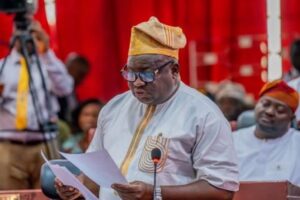
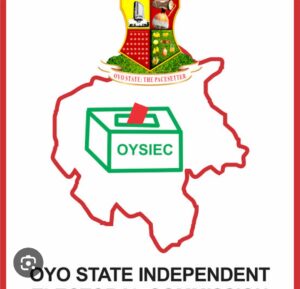
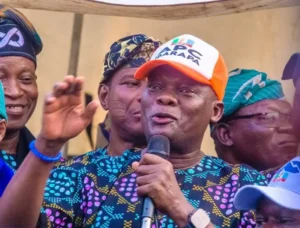
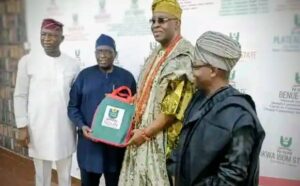
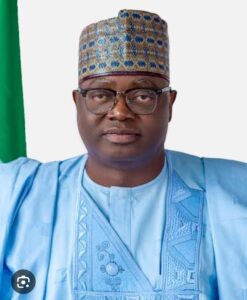
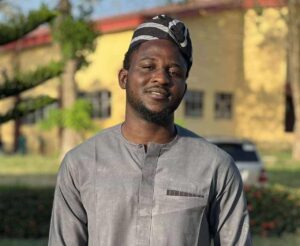
A very brilliant effort. Please let us know the stand of some major stakeholders or aspirants on the issue